Deep Within A French Cave Where No Light Penetrates Are Two Curious Structures: Large Rings Of Stalagmites,

Deep within a French cave where no light penetrates are two curious structures: large rings of stalagmites, some broken and arranged like the rails of old-fashioned wooden fences. When discovered in the early 1990s, scientists didn’t know what to make of the formations, which appeared to be fire-scorched in places. Now, they may have an answer: The rings were built by Neandertals, who learned to explore caves extensively and engaged in complex building behaviors like arranging stones more than 175,000 years ago, much earlier than thought.
The ancient structures—more than 330 meters inside the current entrance to the cave—include a scattering of small, deliberately arranged heaps of stone along with two large rings, one about 2.2 meters across and the other nearly three times that size. The rings and piles are made of about 400 stalagmites of similar size, weighing a total of 2.2 tons.
Most of the forearm-sized fragments are roughly cylindrical and were intentionally broken to the proper length, says Sophie Verheyden, a geologist at the Royal Belgian Institute of Natural Sciences in Brussels. That much is clear, she says, because the pieces are missing both their tips and their bases. “I’m a caver, and those structures are something like I’ve never seen before”…
More Posts from Modernrenaissancewoman-blog1 and Others

Media: Shaping Ignorant Minds For Generations
Phroyd
Dallas' hard-earned diversity of leadership may help city heal after police shootings - The Dallas Morning News An acknowledgement of a dark and painful past, but a positive and hopeful article about the future. Dallas is a diverse city and a great city. My greatest hope is that the visions expressed by city leaders in this article come to pass, and that the rest of the country will follow.

Commentary
A Rallying Cry, A Dirty Word: People Around The World Talk About ‘Feminism’
Last week, we asked a question: What does it mean to be a “feminist” in your country? How do your belief systems and cultural traditions shape your view of how a woman should exercise her rights?
Goats and Soda received hundreds of replies with the hashtag #FeminismInMyCountry. Men and women from Portugal to Tanzania not only answered our question but offered their view of how girls and women still suffer from discrimination, prejudice and stereotyping.
The hashtag particularly struck a chord in South Korea, where citizens are reeling from two incidents concerning women: Last month, a woman was out of a job after wearing a T-shirt that said “Girls Do Not Need A Prince.” And in May, a woman was stabbed to death by a man who said he did it because he “hated women for belittling him.”
From the responses, it’s clear that the debate over the meaning of the word “feminism” is a global conversation. And that in many places, as NPR’s Greg Warner discovered in Rwanda, feminism is considered a dirty word.
One woman in South Korea said that people in her country think a “feminist” is an “antisocial, unattractive woman who’s unlovable by men.” And in Tanzania, a woman shared that although “feminist” means “empowerment” to her, the term is a mere “title” that carries little weight in society. Despite being an aircraft mechanic, she said men viewed her as a “weak, attractive being.”
Here’s a selection of responses from Instagram, Twitter, NPR.org and Facebook, edited for length and clarity. See more comments from more countries, here.
Tanzania: “Men still view me as a weak, attractive being”
I am an aircraft mechanic. Being a feminist means empowering women — but in my country, Tanzania, the term doesn’t have meaning to society. It’s merely a title. At work, men still view and treat me as a weak attractive being. So for me, my country has not really embraced the idea of feminism. -Hawa Nzota
United States: “This isn’t that hard”
This isn’t hard, people. Feminism means women have the same agency as men to body autonomy, to equal wages. It means men shouldn’t be called “weak” for expressing emotion. It means women are considered just as capable as men. It means men are allowed to nurture. This isn’t that hard. Why do we act like this is radical? -Jessica Tonn
United States: “I’m raising my sons to be feminists”
I’m from Oregon. Feminism is still a bad word in my country, as it is perceived to mean that we hate men. I’m raising my sons to be feminists, to help break the cycle. -Heather Novickis
United States: “Many stereotypes surround those who consider themselves feminists”
Illustration by Hanna Barczyk
Fascinating Scientific American article.
We are all one species. The idea of race is an illusion, one we continue to perpetuate. Why can't we accept that people have been treated poorly because of this false idea that the color of our skin makes us different? We have to accept it and try to mend our broken society. Now is the time to change how we treat each other. Now is the time for change.
The struggle is real. The discrepancies can be obvious but are often subtle and so well hidden in deeply ingrained social norms that we fail to notice them. Women can be as guilty of perpetuating and ignoring these inconsistencies as men.
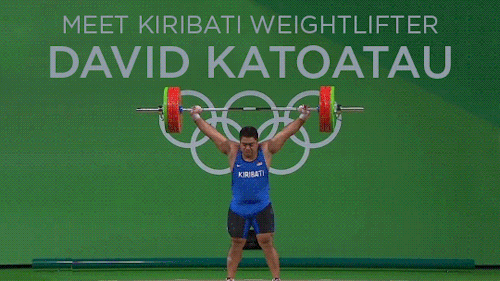
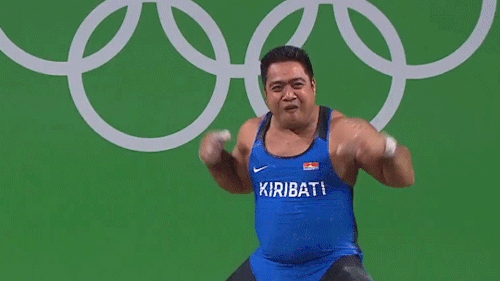
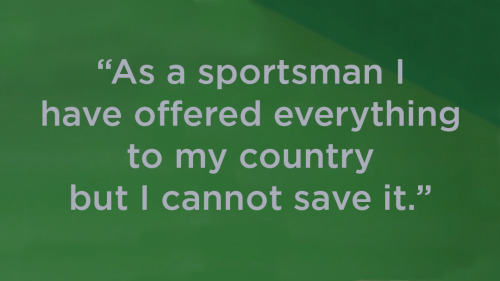
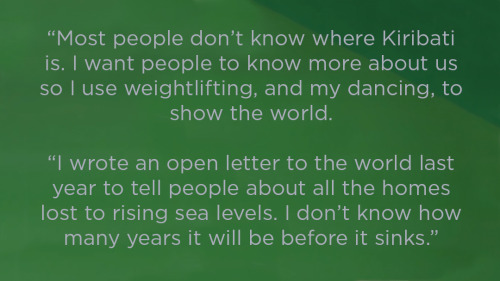
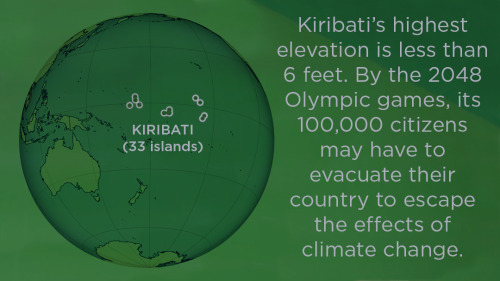

You may have seen the exuberant celebrations of David Katoatau, an Olympic weightlifter competing in the 105-kg weight class for the island nation of Kiribati.
NBC titled their video clip, “Weightlifting makes David Katoatau want to dance.”
But there’s another, solemn reason for his joyful performance. Katoatau told Reuters he wants to raise global awareness of the climate change that threatens to destroy his country.
Video: NBC, Map: Wikimedia









Need some good reads to throw into your beach bag?
Annalee Newitz, founding editor of io9.com, science fiction editor Ann VanderMeer, Ira, and Science Friday listeners all shared their science fiction suggestions for summer. There are literally dozens more here.
What would you recommend?
-
 bombay-dreams liked this · 6 years ago
bombay-dreams liked this · 6 years ago -
 coldplum liked this · 6 years ago
coldplum liked this · 6 years ago -
 things-for-journey reblogged this · 6 years ago
things-for-journey reblogged this · 6 years ago -
 admiralashla liked this · 6 years ago
admiralashla liked this · 6 years ago -
 filmsnobsnart liked this · 6 years ago
filmsnobsnart liked this · 6 years ago -
 black-cat42 liked this · 7 years ago
black-cat42 liked this · 7 years ago -
 mysteriousdeltarays reblogged this · 7 years ago
mysteriousdeltarays reblogged this · 7 years ago -
 mysteriousdeltarays liked this · 7 years ago
mysteriousdeltarays liked this · 7 years ago -
 trindad1 liked this · 7 years ago
trindad1 liked this · 7 years ago -
 fandombitch69 liked this · 7 years ago
fandombitch69 liked this · 7 years ago -
 faunmoss liked this · 7 years ago
faunmoss liked this · 7 years ago -
 metalcrush reblogged this · 7 years ago
metalcrush reblogged this · 7 years ago -
 metalcrush liked this · 7 years ago
metalcrush liked this · 7 years ago -
 meeresbande reblogged this · 7 years ago
meeresbande reblogged this · 7 years ago -
 girlmush liked this · 8 years ago
girlmush liked this · 8 years ago -
 microwut liked this · 8 years ago
microwut liked this · 8 years ago -
 cavesongs1 reblogged this · 8 years ago
cavesongs1 reblogged this · 8 years ago -
 cavesongs1 liked this · 8 years ago
cavesongs1 liked this · 8 years ago -
 ssoporific reblogged this · 8 years ago
ssoporific reblogged this · 8 years ago -
 ssoporific liked this · 8 years ago
ssoporific liked this · 8 years ago -
 valentinvintagegt liked this · 8 years ago
valentinvintagegt liked this · 8 years ago -
 diggingtheoldies reblogged this · 8 years ago
diggingtheoldies reblogged this · 8 years ago -
 mortalkombatpromptsandimagi-blog liked this · 8 years ago
mortalkombatpromptsandimagi-blog liked this · 8 years ago -
 nessotropheion reblogged this · 8 years ago
nessotropheion reblogged this · 8 years ago -
 other-wolves liked this · 8 years ago
other-wolves liked this · 8 years ago -
 dermographer liked this · 8 years ago
dermographer liked this · 8 years ago -
 hebba2405-blog liked this · 8 years ago
hebba2405-blog liked this · 8 years ago -
 boldlyshamelesspeach-blog liked this · 8 years ago
boldlyshamelesspeach-blog liked this · 8 years ago -
 comfortablyynnumb-blog liked this · 8 years ago
comfortablyynnumb-blog liked this · 8 years ago -
 praiseparis25-blog reblogged this · 8 years ago
praiseparis25-blog reblogged this · 8 years ago -
 praiseparis25-blog liked this · 8 years ago
praiseparis25-blog liked this · 8 years ago -
 odiomividaaaa-blog liked this · 8 years ago
odiomividaaaa-blog liked this · 8 years ago -
 what-what-1379-blog reblogged this · 8 years ago
what-what-1379-blog reblogged this · 8 years ago -
 jabbar-rafique liked this · 8 years ago
jabbar-rafique liked this · 8 years ago -
 ultraswissarmywife liked this · 8 years ago
ultraswissarmywife liked this · 8 years ago -
 feacygeab liked this · 8 years ago
feacygeab liked this · 8 years ago -
 blueperiod42 reblogged this · 8 years ago
blueperiod42 reblogged this · 8 years ago -
 upsidedown-losersclub liked this · 8 years ago
upsidedown-losersclub liked this · 8 years ago -
 upsidedown-losersclub reblogged this · 8 years ago
upsidedown-losersclub reblogged this · 8 years ago -
 kimwal60 liked this · 8 years ago
kimwal60 liked this · 8 years ago -
 virelay reblogged this · 8 years ago
virelay reblogged this · 8 years ago -
 theredearth liked this · 8 years ago
theredearth liked this · 8 years ago -
 dragontalon liked this · 8 years ago
dragontalon liked this · 8 years ago -
 iraq-civlayztion-blog liked this · 8 years ago
iraq-civlayztion-blog liked this · 8 years ago
Art, literature, math, science, politics, history, music, philosophy, architecture, health, and the betterment of society are all things that interest me and I find important. This is just my collection of thoughts and knowledge I find interesting or important.
27 posts